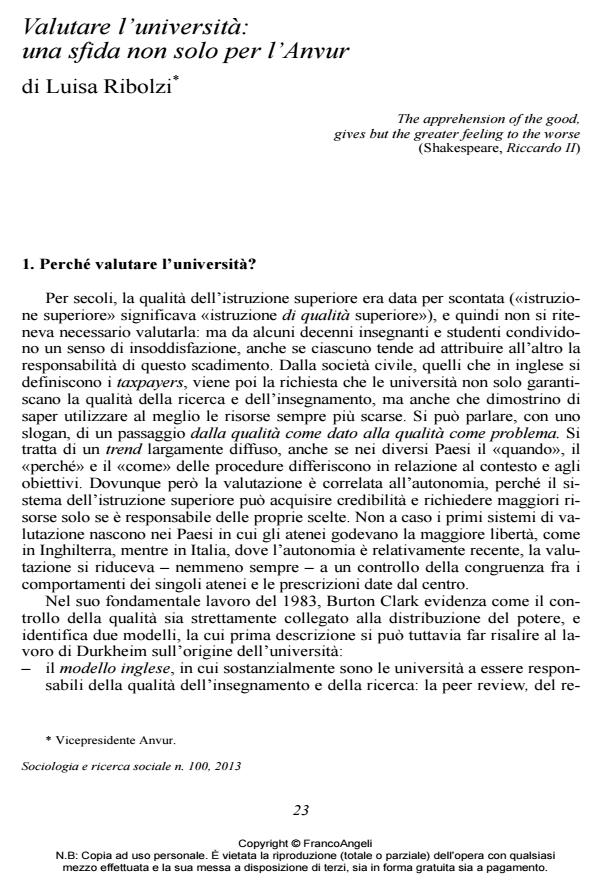Valutare l’università: una sfida non solo per l’Anvur
Titolo Rivista SOCIOLOGIA E RICERCA SOCIALE
Autori/Curatori Luisa Ribolzi
Anno di pubblicazione 2013 Fascicolo 2013/100
Lingua Italiano Numero pagine 10 P. 23-32 Dimensione file 599 KB
DOI 10.3280/SR2013-100004
Il DOI è il codice a barre della proprietà intellettuale: per saperne di più
clicca qui
Qui sotto puoi vedere in anteprima la prima pagina di questo articolo.
Se questo articolo ti interessa, lo puoi acquistare (e scaricare in formato pdf) seguendo le facili indicazioni per acquistare il download credit. Acquista Download Credits per scaricare questo Articolo in formato PDF

FrancoAngeli è membro della Publishers International Linking Association, Inc (PILA), associazione indipendente e non profit per facilitare (attraverso i servizi tecnologici implementati da CrossRef.org) l’accesso degli studiosi ai contenuti digitali nelle pubblicazioni professionali e scientifiche.
National system to evaluate universities started in Europe at the very beginning of 80’s. In that period the growing number of students and the consequent changes in their composition moved the universities from «quality as a fact» to «quality as a problem». In the same time, the need for accountability was a challenge both for the governance and for the Governments, that adopted two different model of evaluating: a direct control or a control through a national independent agency. This paper, starting from Italian experience of Anvur, defines the aims of evaluating universities and research, related to the social role of higher education. It presents the actors, contents and methods (the «who, what, how») of the evaluation process, based on quality assurance and internal assessment, enhancing both technical and cultural problems and perspectives of an issue quite new for Italian universities. The recent introduction by law of research assessment in the Italian academic system has triggered a wide debate especially focused on its weakness and paradoxes as well as its potential negative effects on disciplinary autonomy and freedom of research. Contrary to this vision, in this paper I argue that evaluation mechanisms should be welcomed in those disciplinary fields - as sociology in Italy - which for historical, cultural and political causes have not been able to organize themselves as scientific communities, i.e. as communities of practice grounded on peer control and evaluation. The paper offers a brief sociological analysis of the social organization of Italian academic sociology, highlighting the deleterious effects on scientific communication and value recognition fostered by its segmentation in mutually exclusive, sometimes conflicting sometimes colluding, corporate groups (so called «component»). Far from being an assault on its freedom and autonomy, a state-backed system of evaluation may be instrumental to the creation and legitimation of a disciplinary culture of self evaluation and value assessment according to transparent, institutionalized and not provincial quality standards.
- Il Public Engagement delle università italiane nella VQR 2015-19. Uno studio dei casi Letizia Carrera, Ida Castelnuovo, Gabriela Maria Chiara Cavaglià, Stefania Chimenti, Andrea De Bortoli, Emanuela Pascuzzi, Stefano Piazza, Marina Sardi, in RIV Rassegna Italiana di Valutazione 92/2025 pp.123
DOI: 10.3280/RIV2025-092007 - Valutazione della ricerca: solo effetti perversi? Mauro Palumbo, Sergio Scamuzzi, Paola Borgna, in Quaderni di Sociologia /2024 pp.7
DOI: 10.4000/13k0d
Luisa Ribolzi, Valutare l’università: una sfida non solo per l’Anvur in "SOCIOLOGIA E RICERCA SOCIALE " 100/2013, pp 23-32, DOI: 10.3280/SR2013-100004